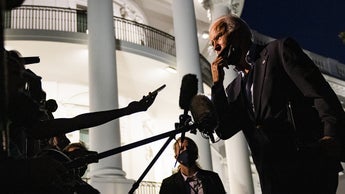
Biden, who has seen his approval ratings drop as he deals with a rash of negative headlines, has also largely shunned reporters’ questions in recent weeks, including after his comments on a poor September jobs report and again following the slowdown of the U.S. supply chain.
The interviews that Biden has conducted have largely been traditional network television interviews, though the president has also sat down with People Magazine and ESPN for the start of baseball season.
Biden has taken questions from reporters at various events since taking office, but the number of one-on-one interviews lags far behind his predecessors.
Former President Obama sat down for more than 113 interviews and former President Trump did more than 50 interviews through the summer of the first year of their respective administrations, according to Mark Knoller, the veteran White House correspondent who actively tracks presidential interviews.
Biden’s last one-on-one interview was with ABC’s George Stephanopoulos in August.
Such interviews can be risky and rewarding for presidents. They can lead to unscripted moments, creating pitfalls if a president says the wrong thing or isn’t ready for a question, but also opportunities if a president hits an interview out of the park.
When presidents do not do interviews, it raises questions about whether they are worried about handling the questions they might get, and whether they see little opportunity to gain from the one-on-ones.
Before flying back to Washington on Friday, Biden did take questions from reporters for the first time in more than a week on topics ranging from the stalled infrastructure legislation to the hospitalization of former President Clinton.
But his lack of long-range, in-depth interviews has garnered attention from even Democrats.
“The problem here is that interviews are a way of getting their message across and not doing interviews means they’re not using all the communications tools they have in their arsenal,” said one top Democratic strategist. “And we all know why they’re doing it. They want to keep him carefully scripted. But carefully scripted isn’t always the best thing.”
Democratic strategist Jamal Simmons put it this way: “Joe Biden can sometimes get off message so putting him in unscripted environments might not be the best way of Joe Biden communicating.
“If you’re an administration trying to communicate a very clear message, using a president in scripted moments may be the best way to amplify those moments,” he added.
The president likes talking to reporters but is famously gaffe-prone. When the coronavirus pandemic limited his schedule, some ended up seeing it as a boon for his presidential prospects.
Democrats close to the White House acknowledge that aides and advisers have purposely kept Biden more scripted. “The best way to eliminate the gaffes is to manage the message,” another Democratic strategist said. “They understand the strengths and weaknesses of the president.”
The strategist also argued the strategy is largely effective and questioned whether the general public cares that Biden isn’t taking more questions.
Martha Kumar, the renowned White House historian who also keeps detailed records on every recent administration, noted that Biden frequently answers questions lobbed at him from reporters summoned to the Oval Office, or on the South Lawn as he prepares to board Marine One.
She said he may just feel more comfortable answering the questions he wants rather than giving full interviews.
“He has done very few interviews, preferring instead to take a question here and there,” Kumar said. “Presidents choose settings where they are comfortable and that suit their goals and interests.”
Yet Biden appears to be taking less questions in those settings in recent days and weeks.
Several commentators on CNN this week publicly noted that Biden was not taking questions before he did so on Friday. And Republicans are starting to take shots.
“Biden hid from the American people throughout the campaign and he continues to hide as president – lacking true leadership and accountability for his many failures,” said Emma Vaughn, a spokesperson for the Republican National Committee.
Republicans have sought to use the 78-year-old Biden’s age against him, suggesting he lacks the stamina or mental energy to be president.
“Unfortunately, your mental decline and forgetfulness have become more apparent over the past 18 months,” Rep. Ronny Jackson (R-Texas), a close Trump ally who served as a White House doctor, wrote in a June letter to Biden signed by 13 other Republicans. They demanded he get a cognitive test.
Conservative television host Sean Hannity has also pounded that drum, telling his viewers that Biden’s cognitive problems “are becoming worrisome to me.”
The White House has written off the criticism, choosing not to weigh in on the matter, seeking to get above the fray. White House officials did not respond to a request for this story.
Earlier this year, White House press secretary Jen Psaki nodded at part of their communications strategy, saying Biden shouldn’t engage with reporters who shout questions at him during press scrums.
“This is not something we recommend,” Psaki told David Axelrod, the former Obama senior adviser, during an interview on his podcast. “In fact, a lot of times we say, ‘Don’t take questions.’ ”
But she added, “He’s going to do what he wants to do because he’s the president of the United States.”
And Democratic strategist Joel Payne said so far the strategy has worked for Biden.
“There’s no doubt the White House is managing media access to President Biden but the public still feels they hear regularly from the president and his administration without traditional reporter Q and A’s,” Payne said. “So as long as the public is satisfied with their access to the president and there’s no political penalty being assessed, there’s not a lot of motivation for the White House to change course.”
Via The Hill
